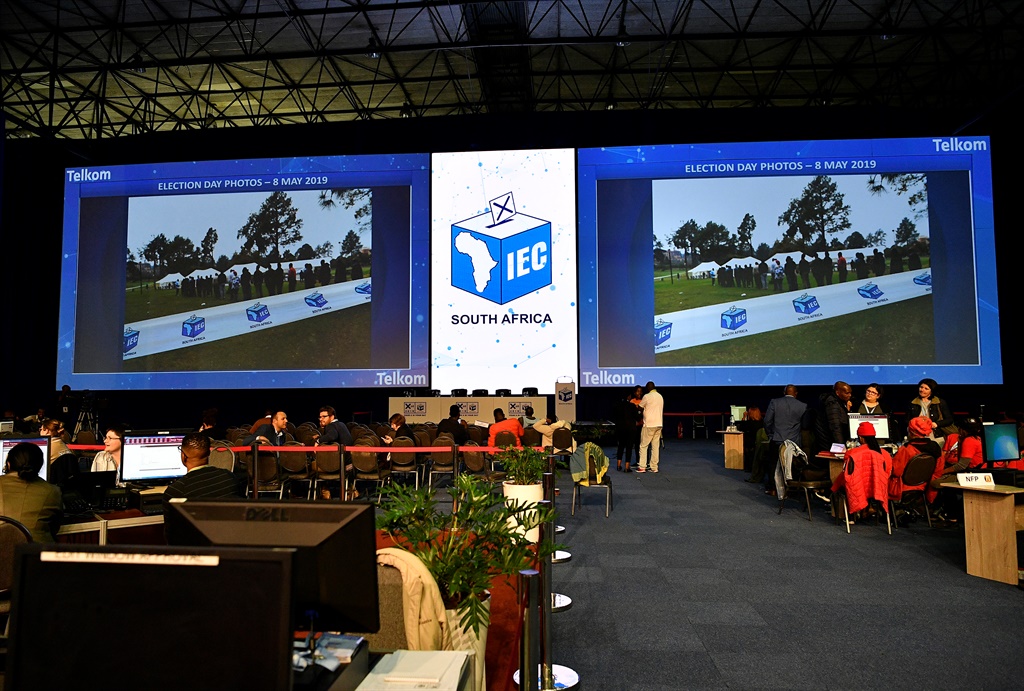


Various political party observers sit inside the Independent Electoral Commission Results Centre in Pretoria after South Africa’s national and provincial elections on May 8, 2019. (Phill Magakoe, AFP)
- Parliament has 24 months to change our Electoral Act to allow independent candidates to contest the national and provincial elections.
- A landmark ruling by the Constitutional Court has altered our politics forever.
- The president and premiers could now, technically, be elected from representatives who do not belong to a political party.
If it wasn’t for the virus that has turned our lives upside down, all we would have talked about at the braai this weekend would have been the landmark Constitutional Court judgment that has changed our electoral system forever.
In short: the highest court in the land has ruled it is unconstitutional that you can only become president of South Africa (or the premier of your province) if you belong to a political party.
The court has given Parliament 24 months to rectify the Electoral Act to allow independent candidates to participate in national and provincial elections and to be elected as Members of Parliament (MPs) or members of the provincial legislature (MPLs).
Serjeant at the Bar: ‘Groundbreaking’ ConCourt decision could make public representatives more accountable
As with the local government elections, you will now be able to vote for individuals who are not aligned with a specific political party when you vote again in the national and provincial elections.
The court has effectively introduced a constituency system to Parliament and the provincial legislatures that has the potential to cause major shakeups in the future of our politics – particularly in the wake of the devastating effects of Covid-19 on all spheres of life.
Our current electoral system for national and provincial elections is called proportional representation or in short, PR. This means that parties like the ANC, DA and EFF draw-up a list of candidates with their presidential candidates on top, followed by their most popular or senior party members (each party has their own way of drawing up their lists).
Depending on the percentage of votes each party obtains, they then get a proportion of seats and the lists determine who become MPs and MPLs.
For example: The National Assembly has 400 seats. If a party, under the PR system, wins 10% of the vote, they get 40 seats. Those seats go to the first 40 people on the party’s list.
This allowed parties to become incredibly powerful centres of power for career politicians. Your constituency and your principles no longer mattered when you had to tow the party line, determined by the party bosses in Marshalltown, Bruma or Braamfontein.
The introduction of a constituency system – as with local government elections – will create a hybrid system whereby we also vote for people in our wards who may or may not belong to a political party.
Constitutionally, the PR system must remain, but depending on what Parliamentarians debate and decide over the next two years, it may be supplemented by a single-representative constituency system.
For example: if you live in Bryanston in Johannesburg, you could be given two ballot papers for your national vote. The first paper will have a list of people from your community, who are either aligned to a political party or not (constituency system). The second paper will have a list of political parties (PR system).
The individual who receives the most votes in a constituency (made up of a number of wards) will go to Parliament. This creates the potential for popular and respected community leaders to be elected to the legislature.
The PR votes will tally to the parties’ final score, from which a portion of seats are allocated.
In 2003, the late former politician and academic Frederik van Zyl Slabbert chaired an electoral task team for Cabinet and recommended a hybrid system, like the one we are moving towards. He suggested that 300 seats in the National Assembly go to constituency representatives and 100 to PR votes.
READ | Electoral reform: Time to dust off the Van Zyl Slabbert report?
This is the kind of detail that will be heavily debated over the next two years by the parties currently represented in Parliament, all of whom must be extremely anxious about the prospect of competing with local community leaders who choose not to belong to a political party.
This has not been a good year for our major political parties and globally there is a move away from traditional party politics, that is seen to be entrenching corrupt political elites.
Here is something to chew on. The ANC and EFF have both argued that next year’s local government election should be postponed and are in favour of synchronised elections where we vote once every five years for national, provincial and local government.
If there is agreement to postpone the election, and the process of redrafting our Electoral Act is finished by mid-2022, a case may be made to bring the 2024 election forward with a year or more to kick-start a new, all-at-once system of voting.
And this time, you may even be able to vote for someone you know and trust to represent your voice.
– Basson is editor-in-chief of News24.

